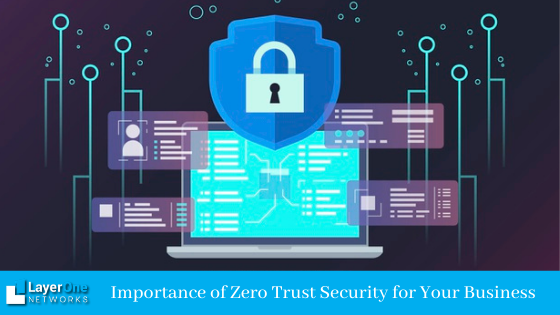The way in which businesses operate today is a far cry from what it was a couple of years back. The hard truth? The information is no longer as secure as we thought it was.
With so many hacking attempts and everyday news of security breaches, it’s becoming harder to trust any person or technology. In other words, zero trust sounds like the best idea.
This forms the crux of zero trust security, where every person or access is considered hostile until proven otherwise. This zero trust notion was first introduced in a paper in 2010 by John Kindervag from Forrester Research. Soon the term caught on, considering the volatile and technologically advanced world we’re living in.
A zero trust solution for data security essentially means that every request isn’t trusted until it’s verified. And this happens every single time a user tries to gain access or sends a request. So, why should you consider zero trust security for your business? Let’s find out.
5 Reasons Why Your Business Needs Zero Trust Security
At LayerOne Networks, our security experts have implemented zero trust security systems for some of our clients. In this blog, we’ll explain why you need to include zero trust security as a part of your managed IT services.
1. You Need Additional Protection for Integration with Third-Party Services
Many times, we tend to link our software with other third-party applications to improve productivity. Or, we use multiple tools to build an application. For example, software developers may use third-party services for logging, authentication, and other similar needs. So, in the end, even a single software may have a host of different applications that have access to the information.
This is when zero trust security plays a crucial role. When every single request passing through the application is verified, we can prevent access or attacks from happening through these third parties.
2. You Get Complete Visibility into the Logins
The zero trust security works with the notion that the system is already compromised and has to verify every action. While it acts on the process of verification, it never trusts anything.
So, the visibility of the traffic to the application plays a central role in the security. Every single network log, access, the location of the access, and other details are recorded. The security team can monitor these movements of data and the login details for every single one of the users.
You can also use this data to analyze the attacks or attempts of hacking to pinpoint the exact location, user, and nature. One important point to note here is that zero trust security also monitors the DNS traffic, which is usually unchecked in traditional systems. This helps to avoid unauthorized data access and predict exfiltration.
3. You Need to Maintain Data Security Even with the Remote Work Culture
Ever since the pandemic hit us more than 18 months back, the remote work culture has become a norm. Many companies have permanently allowed for WFH, while some are still in the transitional stage.
If you have some of your employees working from home, we have to realize that their home networks wouldn’t be as secure as our office networks. It is easier to hack into your enterprise using the home networks.
Zero trust security becomes helpful in such cases since it already considers that the threat is in. It suspects every single request and interaction to and from the application, which means it can stop and verify new instances of request from the WFH employees and prevent any security attacks.
4. You Can Reduce Your Vulnerability
Let’s face it. Every organization that has some amount of dependency on online tools and applications is prone to cyberattacks. And we also have lots of vendors, external service providers, and freelancers that have access to our network. So when you’re switching IT providers or moving to new freelancers, they may still have access even after they’ve stopped working for your business.
When there’s something you can do to minimize your vulnerability and increase your security, it’s essential to consider it. Otherwise, you can’t imagine the consequences of your customers’ sensitive information and operational data falling into the wrong hands.
Zero trust security disallows application access until the user can positively prove their identity. It analyzes the way the device or the user is communicating, the network through which they’re communicating, and puts them through various authorizations to verify them.
Every communication through the application is checked for malicious attacks, which means your business operations will be better protected than most other security systems.
5. You Can Minimize the Security Tech Stacks
As more and more cyberthreats are cropping up and hackers are coming up with new ways to gain access or threaten organizations, the security stacks that are needed to protect ourselves have also increased. So when you want the manpower to implement so many of these tech stacks, you need to hire a big security team to build and manage them.
But with zero trust security, you can do away with most of the security tech stacks and replace them with a single device in the cloud that monitors every piece of communication. You can minimize the complexity of the projects and the technologies needed and to save on employee costs.
Wrapping Up
In today’s distributed organization, the importance of data security has increased by folds. Zero trust security can reduce your vulnerabilities and improve data protection through the application.
LayerOne Networks is one of the top IT consulting firms offering managed IT services, data security solutions, and IT consulting services. If you have a business in Corpus Christi and are searching for ‘IT services near me,’ then reach out to us now.

